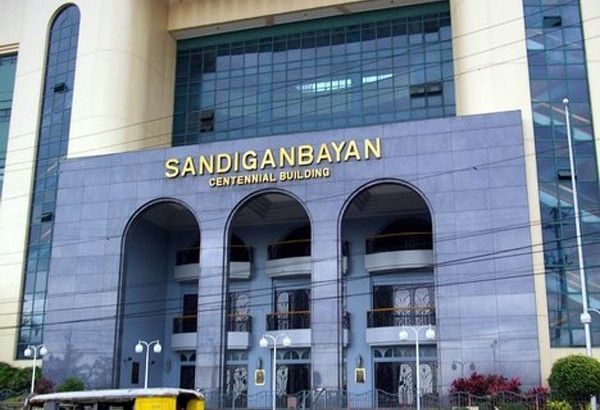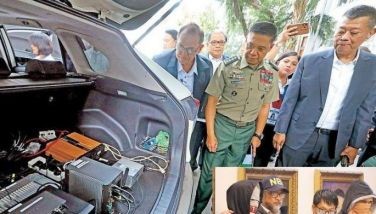Sandigan orders bank to pay P373M in Marcos ill-gotten wealth

MANILA, Philippines — Sandiganbayan has ordered Royal Traders Holding Co. Inc. to pay the government at least P373.49 million that the anti-graft court found to be part of the ill-gotten wealth of the late dictator Ferdinand Marcos and his family.
In a 52-page decision, Sandiganbyan also ordered the RTHI, formerly the Traders Royal Bank, to pay 12% interest each year "reckoned from February 1993, until all the amounts are fully paid."
The court based these amounts — P65.98 million, P30.05 million and $5.44 million ($1:P50.92) — on bank certificates recovered from the Marcoses when they landed in Hawaii in 1986 after fleeing the Philippines.
When the dictator died, his wife Imelda agreed to give the Marcoses' stake in seized items to the Philippine government. In return, the government agreed to drop cases against the family.
But the TRB refused to pay the Presidential Commission on Good Government — the agency tasked with recovering Marcos' ill-gotten wealth — when it tried to collect these amounts in 1993. PCGG then filed a case against TRB in 1997.
NEWSLAB: Money trail: The Marcos billions
Why does this matter?
The ruling in favor of PCGG, representing the Filipino people, is the latest legal recognition of the Marcos family's ill-gotten wealth amid continued attempts to downplay their massive looting of public funds.
In a hearing on the Department of Justice's 2022 budget, the PCGG, an attached agency, told lawmakers at the House of Representatives that it still has to recover P125 billion in ill-gotten wealth.
As of September 2021, PCGG Commissioner John Agbayani said, the agency has recovered a total of P174 billion.
"This amount of money has been distributed to our Agrarian Reform Program in the amount of P79 billion," Agbayani told lawmakers. Another P76 billion, he added, was given to the Coco Levy Trust Fund.
He also said the PCGG has "set aside more or less P11 billion to implement the provisions of the [Human Rights Victims Reparation and Recognition Act of 2013] in order to compensate our human rights victims."
Decades since the overthrow of dictator Ferdinand Marcos, the chase to recover the ill-gotten wealth amassed by the Marcoses continues.
The Supreme Court affirms the Sandiganbayan's ruling in 2019 dismissing the P1.05 billion ill-gotten wealth case against the late President Ferdinand Marcos Sr, former first lady Imelda Marcos and their alleged cronies for insufficient evidence.
In September 2019, Sandiganbayan also dismissed the civil forfeiture case due to the insufficient evidence presented by Presidential Commission on Good Government. Sandiganbayan affirmed that earlier dismissal in November of that year.
On Wednesday, July 19, the high court says it agreed with the Sandiganbayan saying that "while it is truly disappointing that nothing has come of this case despite the lapse of 36 years spent in litigation, the Court agrees with the Sandiganbayan that petitioner's evidence is insufficient to support the allegations of its Expanded Complaint by a preponderance of evidence."
Former CHR chief Rosales says the Duterte administration should replace Solicitor General Jose Calida, who is acting as the government's chief counsel, who she criticized as being pro-Marcos.
Following the dismissal of another Marcos ill-gotten wealth case, former Philippine human rights chair Etta Rosales says Solicitor General Jose Calida, acting as the government's chief counsel, should be replaced. #ANCEarlyEdition pic.twitter.com/6Q2jQ14aD3
— ABS-CBN News Channel (@ANCALERTS) October 29, 2019
Former Commission on Human Rights Chairperson Etta Rosales calls out the seeming ineptitude of the Presidential Commission on Good Government that led to the recent junking of the P267.371 million ill-gotten wealth case against the Marcoses over a mere technicality — the evidence being just photocopies.
This despite the damning content of the evidence which, Rosales says, showed that Marcos crony Fe Roa Gimenez's, Malacañang's social secretary, inexplicable spending beyond her P87,972 per year income.
"From the very beginning may problem ka na. You have what seemed to be an inept, sloppy and incompetent PCGG... and on the other hand you have this Sandiganbayan who had full force of the law [dismiss the case] on a mere technicality," she says in an interview over ANC's "Early Edition."
Rosales adds that the political climate under the Duterte administration may have an effect on rulings on the Marcos ill-gotten wealth cases.
Three cases on the Marcos ill-gotten wealth have been so far dismissed by the Sandiganbayan this year.
The Sandiganbayan dismisses another civil forfeiture case against the Marcoses and their cronies due to "insufficiency of evidence." The case seeks to recover from the Marcos family and spouses Ignacio and Fe Gimenez P267.371 million in alleged ill-gotten wealth.
The anti-graft court says the Presidential Commission on Good Government, represented in court by the solicitor general, failed to present its key witnesses to testify on their affidavits, thus, their affidavits can be considered as "hearsay evidence."
Just early this month, the Sandiganbayan has also dismissed a P1-billion civil forfeiture case against the Marcoses also due to insufficiency of evidence.
Sandiganbayan dismisses another civil forfeiture case vs the Marcoses & their cronies due to "insufficiency of evidence"; the case seeks to recover from the Marcos family and spouses Ignacio and Fe Gimenez P267.371M in alleged ill-gotten wealth. @PhilippineStar pic.twitter.com/TDBJLXBmpa
— Elizabeth T. Marcelo (@marcelo_beth) October 25, 2019
Sandigan also says majority of documentary exhibits presented by PCGG & OSG were mere "unauthenticated photocopies", which cannot be given probative value as evidence. Court says no explanation was even offered why the original documents cannot be presented. @PhilippineStar pic.twitter.com/NhDYr6m2zz
— Elizabeth T. Marcelo (@marcelo_beth) October 25, 2019
Espouses Fe and Ignacio Gimenez were business associates of the late dictator Ferdinand Marcos Sr. and wife former First Lady Imelda Marcos. @PhilippineStar
— Elizabeth T. Marcelo (@marcelo_beth) October 25, 2019
Fe Gimenez was accused of funneling gov't funds to her foreign accounts w/c were later disbursed for her & the Marcoses' "enrichment". She also allegedly acted as conduit of the Marcoses in the purchase of expensive artworks & properties in New York. @PhilippineStar
— Elizabeth T. Marcelo (@marcelo_beth) October 25, 2019
Ignacio Gimenez, meanwhile, purportedly acted as a "dummy, nominee or agent" of the Marcoses in some corporations including the Allied Banking Corp. @PhilippineStar
— Elizabeth T. Marcelo (@marcelo_beth) October 25, 2019
The United States Federal Court in New York directed the transfer of the $13.75 million settlement proceeds to 9,539 Filipino human rights victims during Martial Law.
"[T]here was no hesitation by the Judge in ordering the transfer of funds. She was intimately involved in negotiating the settlement and knew the authority of each of the parties. Class Counsel will now focus on the distribution of $1,500 to each eligible claimant. The distribution will begin May 1 in Butuan followed by sequential distributions in 15 other cities during May, June and July. I will send eligible Class members letters advising them where and when they may come to receive a check," the class suit's lead counsel Robert Swift says in a statement.
Filipino lawyer Rod Domingo says most members of the class suit are poor and need the money for food and medications. Many of the victims of the human rights abuses during the dictatorship of Ferdinand Marcos are also already dead, Domingo says, so the money will provide needed assistance to their families.
The artwork litigation in New York was initiated following the September 2010 sale of Monet's "Water Lily" painting for $32 million by Vilma Bautista, a former aide of Imelda Marcos. Bautista was indicted, convicted and is presently incarcerated in prison in New York for offenses related to the sale.
The litigation is the first human rights class action in world history. Class members are Filipinos who were tortured, summarily executed or disappeared during the Martial Law years.
- Latest
- Trending
































